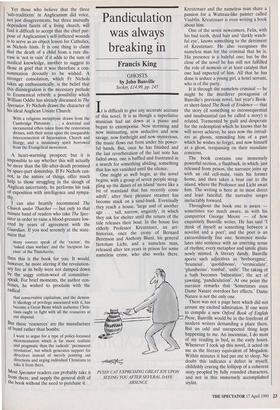Pandiculation was always breaking in
Francis King
GHOSTS by John Banville Secker, £14.99, pp. 245 It is difficult to give any accurate account of this novel. It is as though a superlative musician had sat down at a piano and begun to extemporise. Now storming and now insinuating, now seductive and now savage, now forthright and now mysterious, the music flows out from under his power- ful hands. But, once he has finished and the last reverberation of the last note has faded away, one is baffled and frustrated in a search for something abiding, something that has not vanished until the silence.
One might as well begin, as the novel begins, with a group of seven people strug- gling up the dunes of an island 'more like a bit of mainland that has recently come adrift', after their pleasure steamer has become stuck on a sand-bank. Eventually they reach a house, 'large and of another age . . . tall, narrow, ungainly', in which they ask for shelter until the return of the tide releases their boat. In the house live elderly Professor Kreutznaer, an art- historian, once the crony of Bernard Berenson and Anthony Blunt, his general factotum Licht, and a nameless man, released after ten years in prison for some nameless crime, who also works there.
PUSSY CAT EXPRESSING GREAT JOY UPON SEEING YOU AFTER SEVERAL DAYS' ABSENCE Kreutznaer and the nameless man share a passion for a Watteau-like painter called Vaublin. Kreutznaer is even writing a book about him.
One of the seven newcomers, Felix, with his bad teeth, dyed hair and 'darkly watch- ful eye', knows something to the detriment of Kreutznaer. He also recognises the nameless man for the criminal that he is. His presence is a baleful one; but by the close of the novel he has still not fulfilled the role of nemesis or at least catalyst that one had expected of him. All that he has done is seduce a young girl, a hotel servant, who is of the party.
It is through the nameless criminal — he might be the murderer protagonist of Banville's previous novel, last year's Book- er short-listed The Book of Evidence — that the story (if something so inconsequential and insubstantial can be called a story) is related. Tormented by guilt and desperate for the redemption which he knows that he will never achieve, he sees now the intrud- ers as ghosts, reminding him of a past which he wishes to forget, and now himself as a ghost, trespassing on their mundane concerns.
The book contains one immensely powerful section, a flashback, in which, just released from prison, the narrator joins up with an old cell-mate, visits his former home, and then takes a boat out to the island, where the Professor and Licht await him. The writing is here at its most direct and least fanciful; the narrative surges ineluctably forward.
Throughout the book one is aware — sometimes too much aware, as with his compatriot George Moore — of how exquisitely Banville writes. He has said 'I think of myself as something between a novelist and a poet'; and the poet is an extraordinarily fine one. Sentence modu- lates into sentence with an unerring sense of rhythm; every metaphor and simile glints newly minted. A literary dandy, Banville sports such adjectives as 'borborygmic', 'brumous', 'quotidinous', 'vermiculate', 'plumbeous', `tombal', 'anile'. The taking of a bath becomes 'balneation'; the act of yawning, 'pandiculation'. At one point the narrator remarks that 'Sometimes even Dame Nature overdoes her effects.' Dame Nature is not the only one.
There was not a page here which did not arouse my excited admiration. If one were to compile a new Oxford Book of English Prose, Banville would be in the forefront of modern writers demanding a place there.
But an odd and unexpected thing kept happening to me. An insomniac, I do most of my reading in bed, in the early hours.
Whenever I took up this novel, it acted on me as the literary equivalent of Mogadon.
Within minutes it had put me to sleep. No doubt this indicates a defect in myself, childishly craving the lollipop of a coherent story peopled by fully rounded characters, and not in this immensely accomplished stylist.


















































 Previous page
Previous page